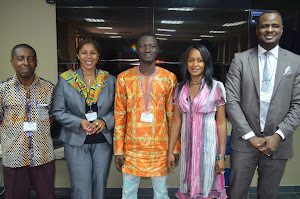BY EDMUND SMITH-ASANTE
 |
| A section of Ghana's Akosombo Dam |
A study into how large dams in West Africa have affected local people has identified ways to share the benefits of future dams more equitably and create development opportunities for communities.
The study, published Wednesday November 23, 2011 by the Global Water Initiative, which is supported by the Howard G. Buffett Foundation, shows that large dams could bring greater benefits to local populations.
According to the study, people’s reasons for dissatisfaction include insufficient and poorly planned compensation for losses suffered as a result of the dam’s construction and later impacts, as well as difficulties in taking advantage of the benefits the dams offered – such as a lack of programmes that enabled communities to take advantage of the new potential for fishing, or having access to the electricity generated.
The study also unearthed an absence of clear and agreed rules for resource management or a clash between national laws and local customary practices, and especially who has what rights to what land.
To these challenges, the study identified five approaches that can overcome them, such as the involvement of local people in the benefits the dam creates and in all decisions about its construction, investment, compensation, relocations, etc.
It also recommends replacement of compensation policies that reproduce previous living conditions with ones that enable local people to adapt to the changes the dam will bring, and to benefit from them and development of local production systems, by ensuring access to land and resources in ways that are compatible with both national law and customary practices.
According to the study, the establishment also, of local regulations in agreement with local stakeholders to enable fair and sustainable use of resources and the support of local people’s access to the dam’s benefits by establishing preferential local access to benefits such as irrigation and electricity and by creating a local development fund that is financed by the dam’s economic activity, are approaches that can give dam communities more leverage.
Commenting on the findings of the study, Aliou Faye of the International Union for the Conservation of Nature, which collaborated with the Global Water Initiative said “When countries build large dams, the goal of national development has often overridden the potential for local or regional development — and local people are often left dissatisfied.”
For his part, Jamie Skinner, a principal researcher at the International Institute for Environment and Development and co-author of the report added: “Efforts to ensure that local communities benefit need not clash with national development objectives, nor do they need to be very expensive, saying, “Developers need to work with local people, and not see them mainly as an obstacle to national progress.”
To conduct the study, the Global Water Initiative (GWI), in collaboration with the International Union for the Conservation of Nature (IUCN), analysed the impacts of six large dams built in the late 1970s and late 1990s in Senegal, Mali and Burkina Faso, and held stakeholder workshops in each country to discuss their findings.
The study focused on the Niandouba and Confluent dams in Senegal, the Sélingué dam in Mali, and the Bagré, Kompienga and Moussodougou dams in Burkina Faso.
Global Water Initiative (GWI), supported by the Howard G. Buffett Foundation, addresses the challenge of providing long term access to clean water and sanitation, as well as protecting and managing ecosystem services and watersheds, for the poorest and most vulnerable people dependant on those services.
The Regional GWI consortium for West Africa includes the International Union for the Conservation of Nature (IUCN); Catholic Relief Services (CRS); CARE International; SOS Sahel (UK); and the International Institute for Environment and Development (IIED).
Meanwhile, in October 2011 the Niger Basin Authority adopted a social and environmental Annex to the Water Charter that lays the foundations for improved social and environmental planning in the vast basin of this 4,180 km river that flows through nine countries (Benin, Burkina Faso, Cameroon, Chad, Côte d'Ivoire, Guinea, Mali, Niger and Nigeria).
It obliges states to assess environmental impacts, consult local people, and adopt progressive tools, such as formal written agreement from people displaced by dams, in a bid to improve social and environmental outcomes.





No comments:
Post a Comment